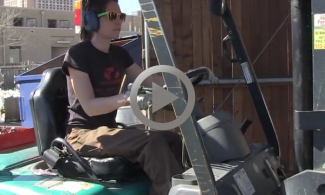Worker Cooperative Section of the San Francisco Congress
(EDITOR'S NOTE: There is a very interesting grassroots development happening in San Francisco: The San Francisco Community Congress. The goal is to "devise practical, locally actionable proposals to shape and direct future policy affecting the local economy and the provision of critical human services." Their mantra, "another San Francisco is possible." If devil is in the details, then this appears to be beginning as a premier solidarity economy project.
Below is a report from Steve Rice (volunteer with the Network of Bay Area Worker Cooperatives [NoBAWC]), Poonam Whabi (Design Action Collective), and Rick Simon (Just Alternatives for a Sustainable Economy) on the Worker Co-operative component of the Congress. This component calls on local government to 1) support incubation, technical assistance, financing and growth of worker cooperatives, and 2) prioritize community economic development through worker-owned businesses.
Please know that you can access a series of reports on the whole the SF Congress at http://www.geo.coop/node/530.
--mj
Below is a brief report back from our experience at the SF Community Congress event that was sent out to the NoBAWC list-serve. A link to the full worker co-op platform is at the end of this entry.
For those folks who have helped out or have been following the work we have been doing with the San Francisco Community Congress (SFCC), here is a brief report back of our experience of the event that took place on Aug 14th/15th.
Some brief context: Since early July, a group of us have been working to put together a worker cooperative platform to present at the SFCC. The purpose of the Community Congress was to articulate a specific and actionable progressive policy platform for San Francisco. The hope being that over time enough momentum can be generated to push some of these proposals into city policy. The broader platform focused on four policy areas: housing, health/human services, transportation & community economic development. Before we became engaged with the process there was already a focus on promoting worker cooperatives within the community economic development platform. However, after attending an initial brainstorming session a few of us thought it would be best to reach out to the Bay Area worker cooperative community so that any policy visions would be sure to incorporate their ideas in regards to how city/county policy could best assist the work already being done. All in all there were about 20 people that helped in some way contribute to the final worker cooperative platform proposals. If you would like to read the full platform that we put together along with a short intro piece that we wrote for the SF Bay Guardian please check it out here: http://ourplatform.wordpress.com. For the Community Congress event itself, we had to whittle down our platform and leave out a lot of the specifics due to time constraints of the event. Below is what we formally proposed and what was finally adopted into the Community Congress platform:
1. Support incubation, technical assistance, financing and growth of worker cooperatives by
a. funding existing co-op development agencies
b. creating a worker co-op track in existing city-funded small biz incubators
c. financing development through a revolving loan fund via the proposed Municipal Bank and
d. educating the public about worker cooperatives as a viable business model
2. Prioritize community economic development through worker-owned businesses by
a. procuring goods and services from existing worker co-ops in order to help them achieve scale
b. creating a large-scale worker co-op development project ? in partnership with anchor institutions and worker co-op development orgs ? that aims to redirect city funds spent on goods and services into economic rejuvenation via worker-owned businesses
The event itself: Varying in size throughout the day, about 30 - 50 people gathered from 10:00 in the morning until 5:00 in the evening to discuss and hammer out the community economic development part of the overall platform (a roughly equal number of folks met in other rooms to discuss the other three focuses of the platform). It took a good while before the facilitation process was tweaked enough to make sure things continually moved forward at a decent clip. We basically worked our way down from top to bottom of the 20 or so platform requests that were being proposed. The floor was open for any clarifying questions or suggestions for amendments and then each platform request went up for a vote. By the time we got to the worker cooperative section of the platform we were pretty close to the end of the day. Poonam did a short presentation on why we believe worker cooperatives should be central to a new vision of community economic development and then we did a quick review of our platform. There was pretty much unanimous support of the policy proposals that we put forward.
Going forward: Then next step with the Community Congress is to figure out how to push local policy makers into moving forward with our policy recommendations. Obviously this is the hard part... However, ironing out the vision is a necessary first step before the agency to make the changes can be mustered. For those that have been involved or following along, we hope that this process has helped some of you think/re-think how local policy can be an asset in pushing the worker cooperative movement. If you would like to continue your involvement in pushing some of these policy ideas forward and/or working to increase our capacity to achieve some of the goals laid out in the longer platform, please contact us.
Here are a few links from articles published in the SF Bay Guardian if you would like to learn more about the event:
To see the full platform statement online or to learn more about the San Francisco Community Congress 2010 please go to these websites:
*SF Community Congress 2010: http://sfcommunitycongress.wordpress.com/




Add new comment